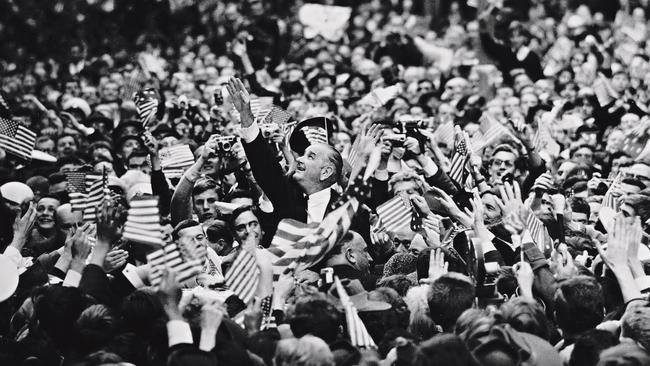Melbourne was, from our perspective, a foreboding place
Growing up in the country, Melbourne was our Gotham City. I thought it was a place of tricksters, gangsters and ‘monied people’.

In 1963, when I was six, my nine-year-old brother developed a hearing problem that required a series of trips to the Eye & Ear Hospital in Melbourne, culminating in an operation. This was a big deal. There was no universal health care at that time.
My mother and brother took day trips to Melbourne by train, three hours each way, to attend pre-operation appointments. Mum was 37 at the time and had never been to Melbourne unescorted. I picked up on her anxiety. She was worried about getting on the wrong tram. She had maps and directories and handwritten notes.
Melbourne was, from our perspective, a foreboding place. We had an uncle who lived in Sydney, which also seemed a world away. And dad had been based in smaller cities like Bathurst and Albury during the war. No one we knew had been to places like Brisbane or Perth, let alone overseas. We were country people. We lived a simple, frugal life, but we didn’t see ourselves as being from “the bush”. Indeed we regarded “the bush” as a pejorative term, a put-down used by city types.
Melbourne was our Gotham City. I thought of it as a place of tricksters, gangsters and “monied people”. (Melbourne people had telephones in their homes; and they took showers, not baths; they were rich!) My Collingwood-raised grandmother talked of gangster Squizzy Taylor, who terrified the city in the 1920s. In the 1960s my parents still talked of wartime murder cases such as the Brownout Stranglings. Terror and fear reverberate across decades.
This idea of the city as a violent place was confirmed in the black-and-white football replays we’d watch on TV. Occasionally there would be an all-in brawl on the field that the commentators were more entertained than concerned by. It was all part of a postwar culture that was shaped, I am sure, by the experience of war.
On one of her trips leading up to Robert’s operation, my mother took me along – largely because I’d thought I was missing out on something exciting. My brother had described the Swanston Street crowds as like being at the Noorat Show. I had to see this for myself! My mother took us to Foy’s Fun Park (on top of a skyscraper, we thought) and then to Coles Cafeteria, where I was shocked by the excess. So many people, so many desserts. Clearly this cafeteria was where Melbourne’s “monied people” ate, I concluded.
Fortunately my brother’s operation was a success and life returned to normal. And only recently I’ve realised that if my mother was doing the same trip today she’d have a mobile phone. Her anxiety would be alleviated by having GPS navigation and a tram app at her fingertips – and if all else failed, she could call someone to help. The mobile phone has delivered personal freedoms to everyday people. It has broadened our horizons.
Crime and violence, though still part of the human condition, seem less overt today. The football experience today is a bit like going to the theatre. Most Australians have travelled interstate and overseas. And these days kids are more likely to find joy in a video game than at a fun park (though personally I think the fun park was better).
I still think there’s a city/country divide in Australia, although I doubt country people are as fearful of the city today as we were all those years ago. What has not changed is the wondrousness of childhood, the bravery of parents in taking on challenges for their kids, and the fact that much about everyday life is reimagined over time. And, generally, change has been for the better.




To join the conversation, please log in. Don't have an account? Register
Join the conversation, you are commenting as Logout